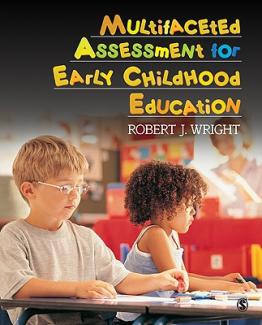
Wide-reaching Implications
Assessments of the Very Young
January 4, 2012

Related Reading
Multifaceted Assessment for Early Childhood Education
Robert J. Wright
SAGE Publications, Inc.
Thousand Oaks, CA
352 pages, ISBN 978-1-41297-015-0, $49.95
Published in 2010, this book provides educators, in particular pre-service teachers, with a broad understanding of current practices in early childhood assessment. The author argues that “there has never been a time when it is more important for early childhood educators to have an understanding of educational assessment and measurement” (p. xix), considering educational accountability and legislation mandating early identification of children with special needs. Very important decisions are increasingly being made based on the results of educational assessments, such as about special needs support allocation, changes in teacher salaries, and early childhood center funding and closings. This book is a timely addition to existing teacher preparation resources.
The content coverage is broad and relevant to current practice and issues in early assessment, ranging from sections on teacher-created assessments and standardized tools to descriptions of assessments for children from birth through kindergarten and older. Throughout the book, the author provides detailed real-world examples of each topic. For instance, on pages 89-90, there is an example of a time-stamped anecdote from a kindergarten observation, describing the challenging behavior of a child who does not want to share a ball with other children on the playground and two different adults’ responses to that behavior. This example is a good one because it is very realistic, so that pre-service teachers in placements could easily imagine this scenario happening in a school playground and could likely relate it to some prior experience.
The book also covers some history of early childhood and assessment, and major issues related to assessment. For example, chapter 10 is on report cards, and reporting to parents, and this chapter covers the potential impacts of reporting children’s performance in report cards on the development of their self-esteem.
Multifaceted Assessment for Early Childhood Education is divided into five parts: 1) Background, current issues, and interpretation of assessments in early education; 2) Formative and summative assessments and tests; 3) Individual screening measures and full assessments; 4) Parent communication and special needs children; and 5) Evaluation of early childhood programs and schools. Each part is further subdivided into chapters, for a total of 13 chapters.
There are three features of the text that serve as advanced organizers: Section descriptions, Introduction and Themes, and Learning Goals. The section descriptions are one-page explanations preceding each part that outline the contents of the upcoming section. Similarly, the introduction and themes outline the content of the upcoming chapters. At the start of each chapter, the learning goals are described in sequential order.
Overall, Multifaceted Assessment for Early Childhood Education provides a complete overview of relevant, current issues in the field. The book is well-organized and could be an excellent learning tool for pre-service teachers. It is critical that pre-service teachers learn about and understand the uses and interpretations of assessments, as they prepare to enter a field in which assessment will continue to have wide-reaching implications for years to come.
– Reviewed by Alissa A. Lange, Ph.D.
Assistant Research Professor, NIEER
For more about early childhood education assessments, check out NIEER’s 2004 policy brief, Preschool Assessment: A Guide to Developing a Balanced Approach, by Ann S. Epstein, Lawrence J. Schweinhart, Andrea DeBruin-Parecki, and Kenneth B. Robin.
About NIEER
The National Institute for Early Education Research (NIEER) at the Graduate School of Education, Rutgers University, New Brunswick, NJ, conducts and disseminates independent research and analysis to inform early childhood education policy.
